Should you add these immune-boosters to your wellness lineup?
There are certain times of the year when you tend to feel like you could use some extra protection from germs, say, during cold and flu season. In general, experts say some key things—a nutritious diet, adequate sleep, and some diligent hand washing—are the best steps you can take to stay healthy. In general, most people don’t need supplements or vitamins for a healthy lifestyle, although doctors do recommend them in certain cases where people may be at a risk for a deficiency. However, we asked registered dietitians if there were herbs or supplements that they take or recommend to people to help support the immune system. These potential immune-boosters may not be right for you (check with your doctor!), but here’s what they had to say.
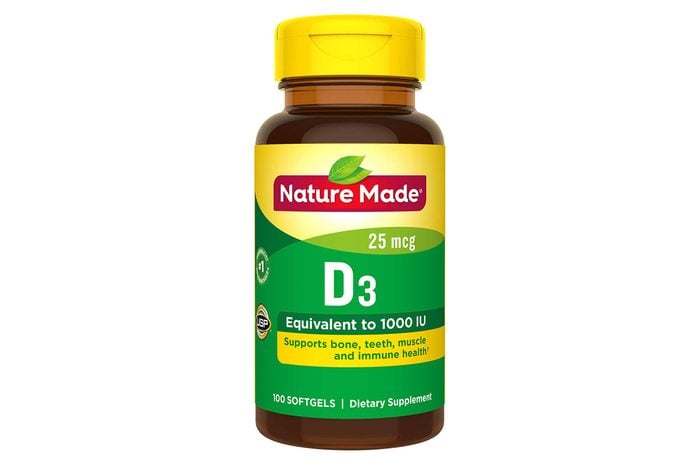
Vitamin D
Vitamin D does more than strengthen your bones. “It’s not a vitamin, but a hormone that boosts your immune system,” explains Vicki Shanta Retelny, RDN, of Simple Cravings Real Food. She recommends vitamin D supplements, especially for people who live in northern climates and don’t get much sun exposure at certain times of the year. Registered dietitian Maria Zamarripa, MS, RD, says, “Vitamin D supports a healthy immune system by acting like a so-called volume control—turning up or down our immune cell actions.” Supplementing with vitamin D may reduce your risk of getting the flu as well as the common cold. Check out these symptoms of vitamin D deficiency.
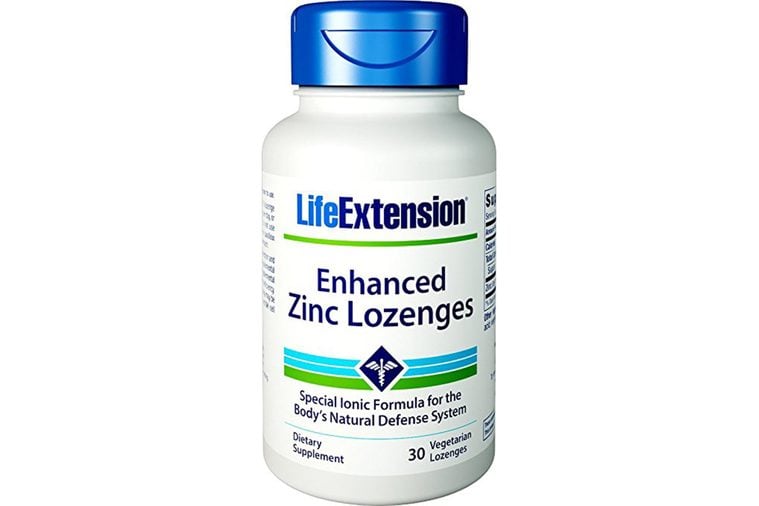
Zinc
This mineral may offer both antioxidant and anti-inflammatory effects. “Research suggests that people who are deficient in zinc have severe dysfunction in their immune systems,” says Ginger Hultin, RD, spokesperson for the Academy of Nutrition and Dietetics. Studies have shown that people who took a zinc acetate lozenge (13.3 milligrams zinc) reduced the duration of cold symptoms (cough, nasal discharge, and muscle aches) compared with a placebo. “Not to mention that zinc is also important for enzyme function, wound healing, and protein synthesis,” Natalie Rizzo, RD, explains.
Hultin recommends getting zinc from food sources like seafood, eggs, legumes, nuts, seeds, and soy products, especially during cold and flu season. Because a little zinc goes a long way—and it’s easy to take too much, resulting in toxicity—she also recommends that you ask your doctor how much may be appropriate for you. Rizzo likes LifeExtension Zinc Caps. They are vegetarian and contain zinc methionate, one of the most absorbable forms of the mineral. (Check out these 21 natural cold remedies that really work.)
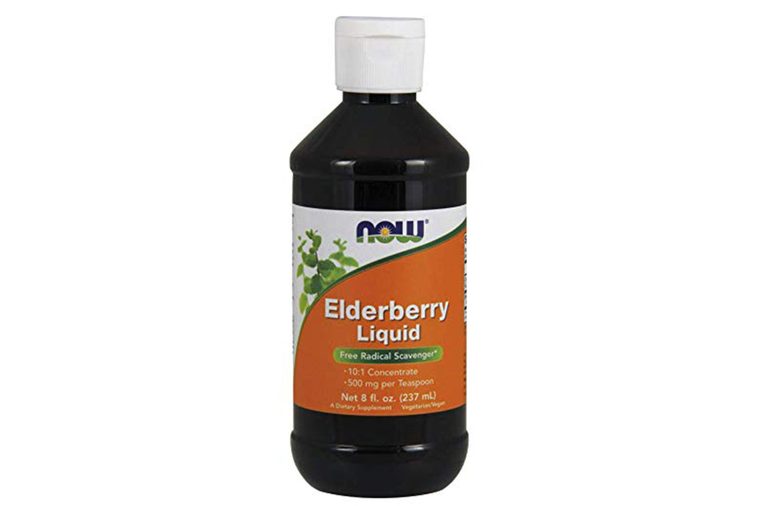
Elderberry
Even though there isn’t much research on it, Chrissy Carroll, RD, takes elderberry extract when other people in her house are sick or when she feels herself coming down with something. A 2016 study in Nutrients found that air travelers who took elderberry extract spent less time sick with a cold and had lower symptom scores than a placebo group.
Carroll says that even if it turns out that elderberry isn’t effective for immune support, it’s generally thought to be safe for short-term consumption and is also rich in phenolic compounds like anthocyanins. She recommends trying NOW Elderberry Liquid or lozenges.
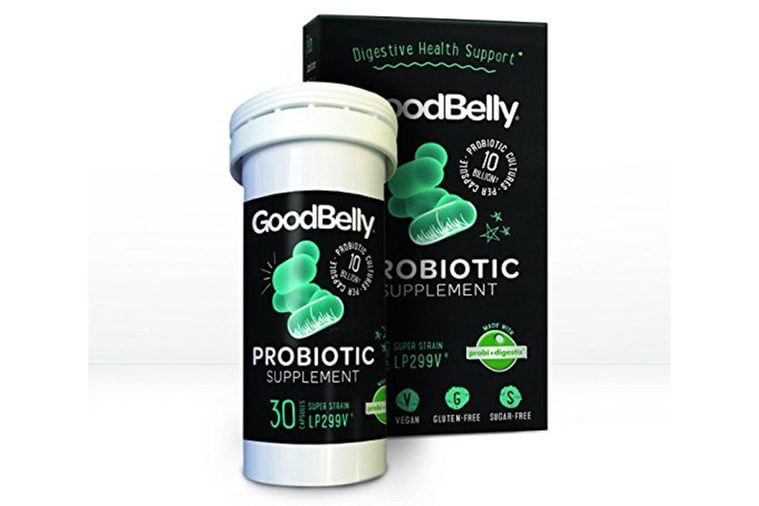
Probiotics
Did you know that 70 percent of your immune system resides in your gut? That’s why taking probiotics may help boost your immune system. Probiotics are friendly bacteria, such as bifidobacteria and lactobacilli, that are naturally found in the intestinal tract as well as in fermented foods such as yogurt, kefir, sauerkraut, and kimchi. “These friendly microbes help protect the body from disease-causing microbes. They also produce substances that keep the lining of the gut healthy, improving immune function and warding off inflammation,” explains Michelle Loy, RDN.
But not all probiotics are created equal. Registered and licensed dietitian Shannon A. Garcia, MDS, RD, explains, “There are three criteria for good bacteria to be considered probiotics: First, they need to be able to survive the stomach acid, and they also need to colonize the gut. In addition to that, they must provide a benefit—for example, improve the digestive health of the person consuming them.”
My go-to is GoodBelly Probiotic Supplement because it contains ten billion live and active cultures of probiotic strain LP299v. (Here are 12 probiotics brands that nutritionists recommend along with a list of the best probiotic for women).
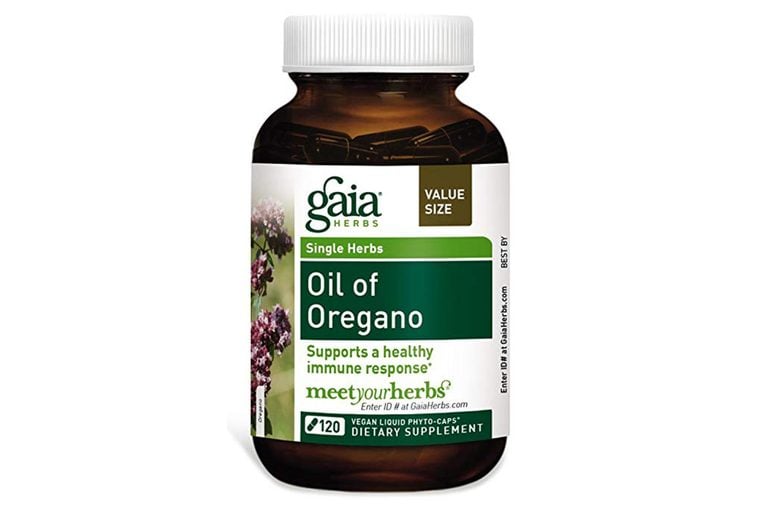
Oil of oregano
Oregano is a culinary herb that has also been used as a medicine for thousands of years. Beyond its uses in the kitchen, you can find oil of oregano as a supplement in capsule or tincture form.
During cold and flu season, oregano could support your health and help manage symptoms. Oregano exhibits antioxidant properties and contains compounds that may help you cough less frequently. Oregano may also help keep your gut healthy by increasing the flow of bile. One type, Gaia Oil of Oregano, is organic and vegan. (Don’t ignore these 9 ways you could be making your cold or flu worse.)
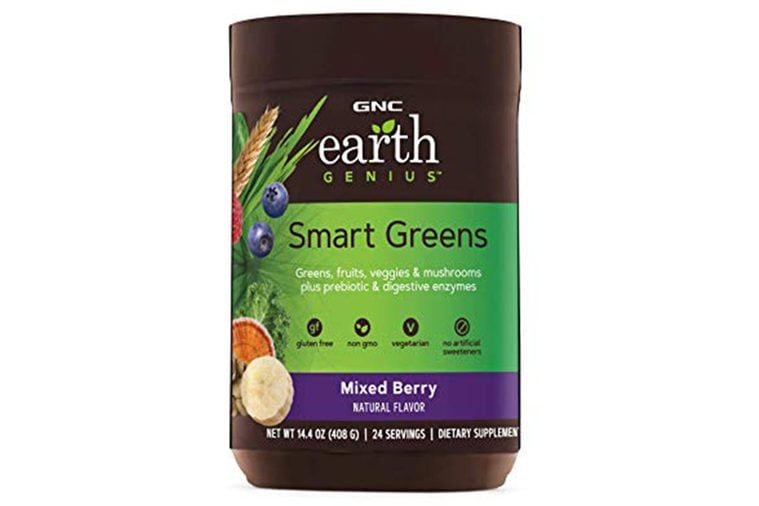
Chlorella
You can find this blue-green algae—which is rich in protein, vitamins, minerals, and chlorophyll—in a powder or capsule. It offers potential antioxidant power and may help lower cholesterol levels. Taking chlorella could be helpful for reducing the risk of iron-deficiency anemia. GNC Earth Genius Smart Greens contains chlorella along with more than 40 fruits, vegetables, greens, mushrooms, and botanicals that you can easily add to your morning smoothie. (Chlorella vs. spirulina: here’s how these two stack up.)
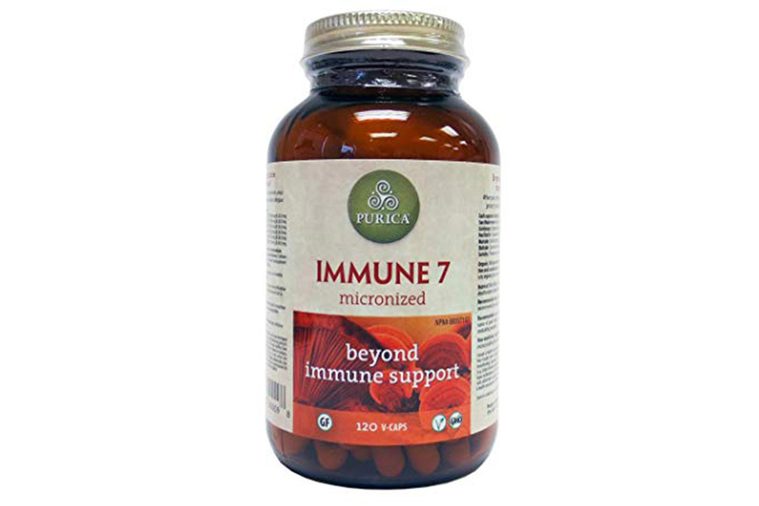
Mushroom extract
Sure, eating mushrooms regularly as part of your immune-system-boosting healthy diet is a great idea—but what if you just don’t like them? Registered dietitian nutritionist Doug Cook, RD, doesn’t, so he takes mushroom supplements. “Mushrooms have uniquely structured carbohydrates that help the immune cells fight infections, including increasing the production of natural killer cells,” Cook shares.
Cook likes Purica mushroom supplements. Beyond Immune Support is a blend of six whole organic mushrooms that have been studied for their potential immune system benefits. (Here are 15 surprising ways to prevent cold and flu.)
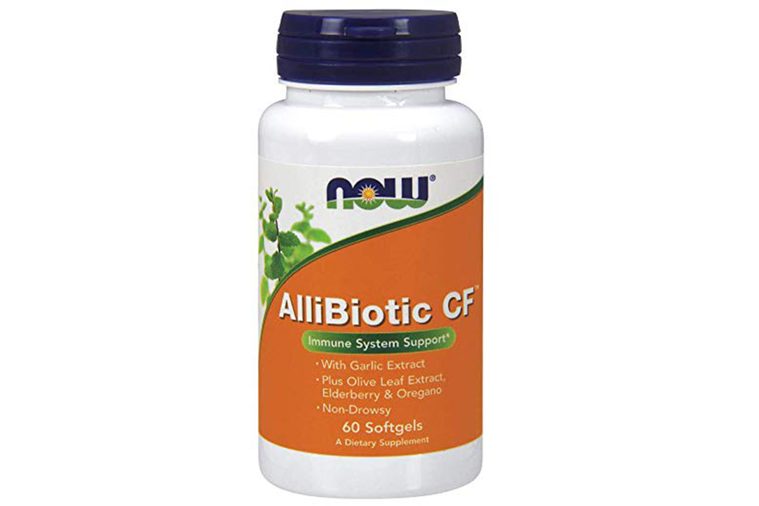
Garlic
Garlic does more than keep the vampires away. According to Dawn Jackson Blatner, RDN, “Garlic strengthens certain types of our immune cells so we are better able to fight cold and flu invaders.” Garlic could help lower your risk of getting sick and help you get back to your old self more quickly. It may also reduce the severity of your cold and flu symptoms. Blatner recommends AlliBiotic CF, which contains not only garlic but also elderberry and oil of oregano for immune system support.
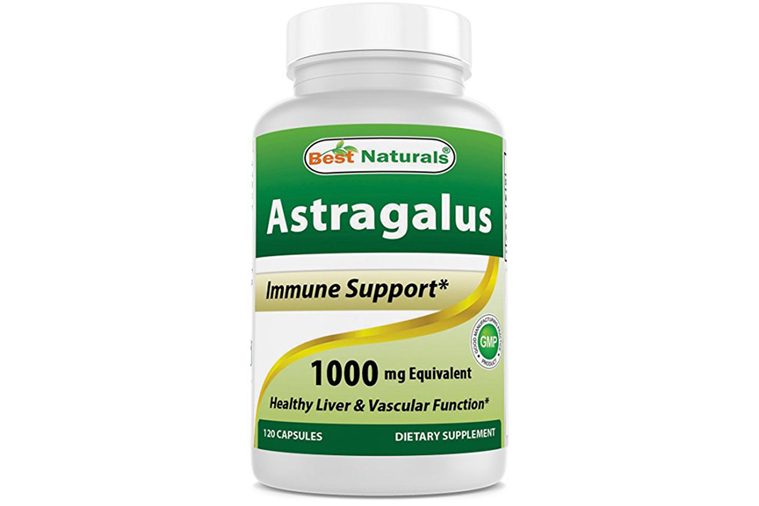
Astragalus
Astragalus is an herb used in traditional Chinese medicine that has many health benefits and has been used for thousands of years to help keep the immune system healthy. Registered dietitian Tracee Yablon Brenner, MS, RDN, CDN, takes astragalus root on a regular basis during the cold and flu season to boost her immune system.
A study from Beijing, China, supports the idea: The herb controls T-helper cells 1 and 2, which help regulate the immune system. Astragalus appears to have antioxidant effects that can help prevent free-radical damage. Best Naturals Astragalus is free of common allergens and contains no artificial ingredients. (You could also try adding these 10 winter foods to your diet to prevent cold and flu.)
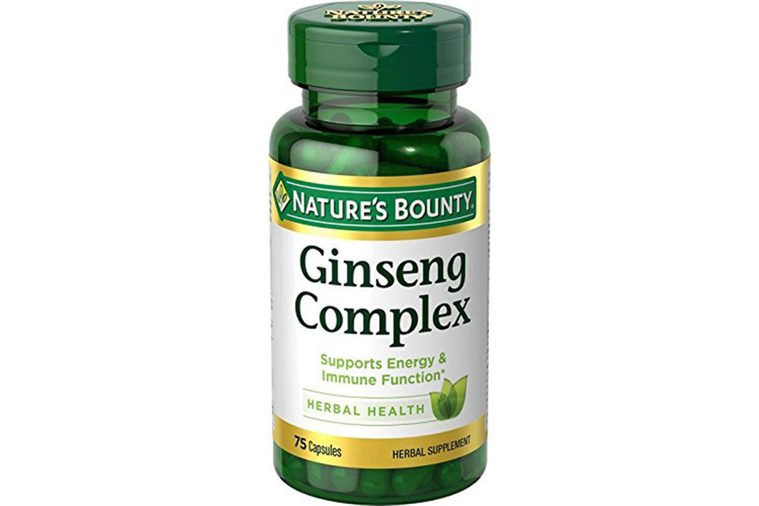
Ginseng
Panax ginseng root may help reduce symptoms such as a sore throat and sneezing. Some research suggests that ginseng may also help shorten the duration of colds so that you start feeling better faster. Taking 200 milligrams a day of North American ginseng may help prevent a cold. Ginseng also provides an energy boost that can help you power through cold winter days.
Nature’s Bounty Ginseng Complex is a blend of three different types of ginseng. It also contains vitamin B12, which your body needs to convert food into energy.
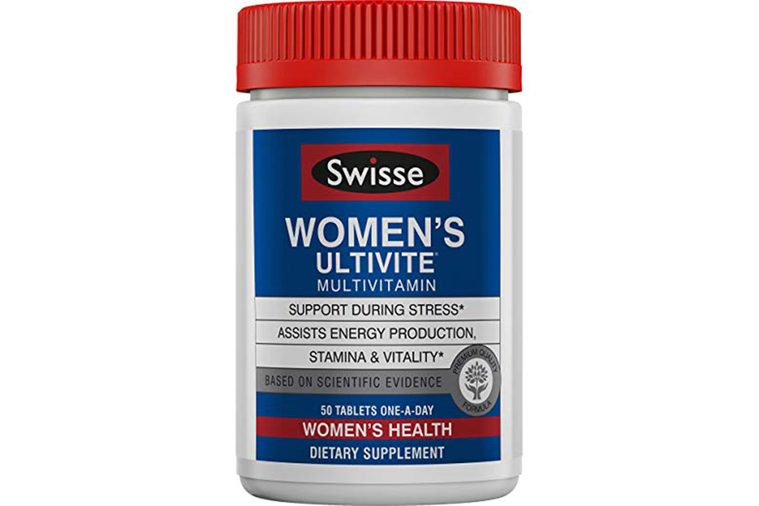
Multivitamin
Does winter have you craving nothing but comfort foods and skimping on the leafy greens? Taking a multivitamin to boost your overall nutrient intake could be helpful. According to Erin Palinski-Wade, RD, “Falling short in even one or two key nutrients can have a negative impact on your overall health and immune system, so a daily multivitamin acts as an insurance policy help prevent nutrient imbalances and deficiencies.”
Palinski-Wade recommends Swisse Women’s Ultivite because it has been shown in clinical trials to support stress while assisting with energy and stamina. “Since high-stress levels have been found to weaken the immune system, having additional support to manage stress may also help to promote a healthy immune system,” she says.
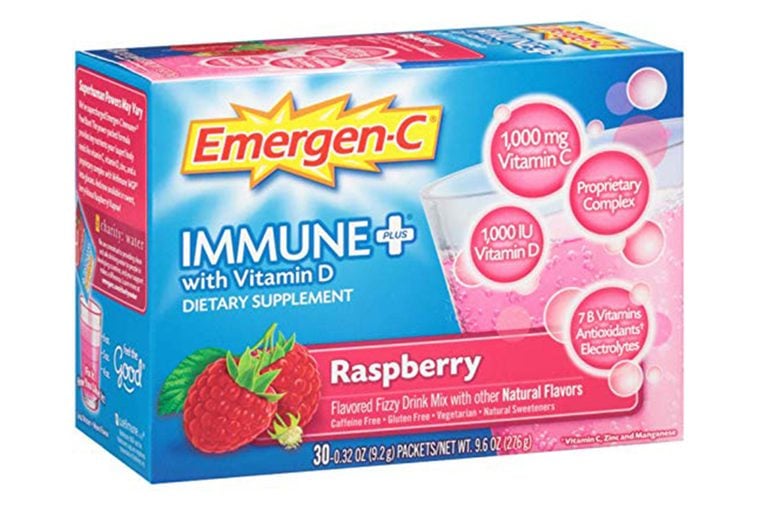
Vitamin C
Vitamin C has been on and off the immune-system-boosting list because of conflicting research. However, says Cook, “Vitamin C supports all aspects of immune function. It’s needed for optimal antibody production and function. Without enough vitamin C, the immune system can be a bit ‘sluggish’ and slower to respond to invading pathogens.” Not only does vitamin C support your immune system when you already have a cold, but there’s also evidence that vitamin C may help the immune system fight infections, which may lead to reduced cold symptoms and cold duration.
Beyond eating plenty of citrus fruit, strawberries, and bell peppers, my favorite way to get extra vitamin C into my day is adding Emergen-C packets to water. That way I’m getting 1,000 milligrams of vitamin C and another two cups of fluid. They have Immune+ powder, which also contains vitamin D. Avoid these 10 foods that could make your cold or flu worse.
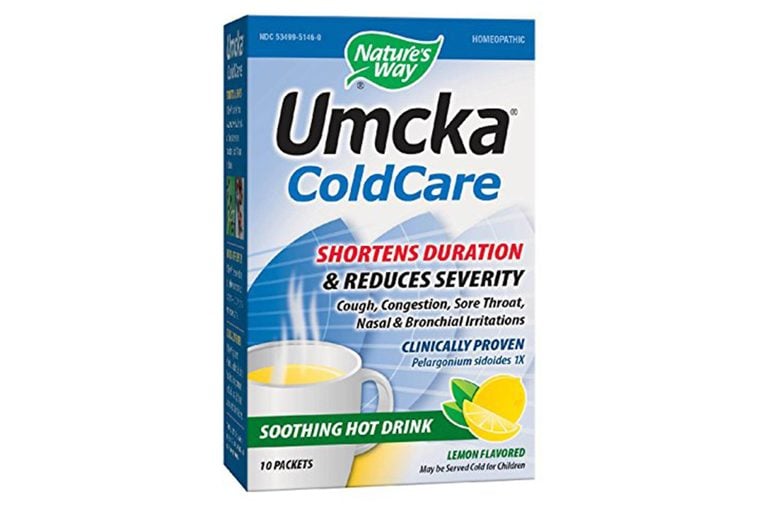
South African geranium
You may have heard of South African geranium as umckaloabo or by its scientific name, Pelargonium sidoides. This plant may help you recover from the cold and flu more quickly and could also make your symptoms less severe.
You can get South African geranium as a chewable tablet, capsule, or liquid. I like Nature’s Way Umcka ColdCare’s lemon-flavored hot drink. It soothes a tender throat, and adding some honey could help suppress your cough, too.

When to see your doctor
Feeling sick is the worst, and sometimes your body can’t fight off infections on its own. You should go see your doctor right away if you’re experiencing any of the following:
- A severe sore throat that lasts more than two days, along with a fever, headache, nausea or vomiting, or a rash
- A fever that gets worse or lasts more than three days
- A cough that lasts more than seven days or is chronic, especially if you have asthma, chronic bronchitis, or emphysema
- A cough with lots of phlegm (mucus) or with a headache or rash
- New symptoms or symptoms that get worse
- Symptoms that last more than seven days
Now check out these 50 ways to avoid catching a cold this season.
